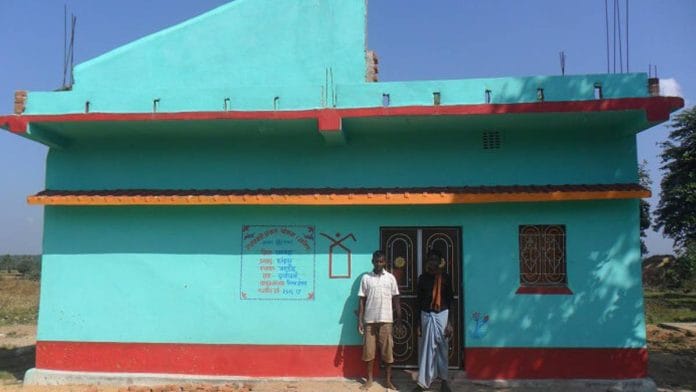New Delhi: Over two lakh landless people identified as beneficiaries under the Centre’s Pradhan Mantri Awas Yojana-Gramin are failing to avail of the PMAY-G benefits due to delays in land allotment by their respective states, a parliamentary panel flagged last month, raising concerns about reaching PMAY-G targets.
The rural development ministry, which has been implementing the scheme, should formulate a policy to ensure the landless beneficiaries get their land parcels within a specified time, the panel led by Congress MP Saptagiri Sankar recommended.
While launching the rural housing scheme in 2016, the Centre sanctioned 5.73 lakh houses for families not owning land parcels in rural areas under the PMAY-G.
However, over 37 percent or 2.12 lakh of them could not avail of the central assistance due to the land allotment delays by the states, according to the latest report of the Standing Committee on Rural Development and Panchayati Raj.
The panel tabled the report in Parliament last month.
Landless beneficiaries are significantly fewer than the total PMAY-G beneficiaries. However, the Centre mandates the allotment of houses to them as a top priority, said a senior official in the rural development ministry.
The PMAY-G was supposed to end in March 2024. However, last year, the Narendra Modi government extended the scheme till March 2029 to construct two crore more houses in rural areas.
In December last year, the Standing Committee on Rural Development and Panchayati Raj tabled another report on the demand for grants for the rural development department in Parliament. The report observed that several states, such as Tamil Nadu, Odisha, Maharashtra, Assam and Karnataka, have not provided land to landless PMAY-G beneficiaries, and it has affected the progress of the scheme.
With the scheme extended till 2029, the panel recommended the ministry frame a policy to address the issue.
It said, “The issue of landlessness is affecting the progress of PMAY-G and may also cause [a] delay in the completion of the target. In this context, the Committee recommend DoRD (rural development ministry) that to ensure land to landless people for their own house, a policy be framed in public interest within a specified period so that land must be allotted to identified persons to expedite the timely construction of houses in their respective States under PMAY-G (sic).”
According to the information provided by the ministry to the committee, Tamil Nadu has the highest number of landless beneficiaries awaiting land allotment or financial assistance to buy land. Of the 98,904 landless people identified under the scheme, 77,498 are yet to get land from the state government.
When contacted, a senior official with the Tamil Nadu government’s rural development department said, “Identifying vacant land parcels for allotment is a long process; a task force has been constituted at all districts to expedite the process.”
Like in Tamil Nadu, in Karnataka, 40,000 of the 55,436 identified beneficiaries are yet to get land. The number of landless people yet to get land in Assam is 31,799, Odisha 22,427, Maharashtra 18,663 and Bihar 11,093.
A senior ministry official said the ministry ordered the states to form a task force and ensure all landless beneficiaries get either land or financial assistance to buy it and build their house by availing of the central assistance.
“Providing housing to landless beneficiaries is our top priority. But, as land is a state subject, we have asked all states to provide land to landless beneficiaries. Some states are providing land under various schemes. We have asked states to expedite the process,” said a senior rural development ministry official who did not wish to be named.
Bihar offers Rs 60,000 for buying land under the Mukhymantri Awaas Sthal Kray Sahayta Yojana, whereas Maharashtra provides Rs 50,000. “The Maharashtra government plans to increase the amount to Rs 1,00,000,” said a senior rural development ministry official.
In Odisha, a senior ministry official said, “Under our Vasundhara scheme, the state government is providing land to landless people.”
The Centre, in 2016, sanctioned 2.95 crore houses under the PMAY-G, with 2.66 crore houses having been completed since and 29 lakh yet to be built.
A few months ago, the ministry ran an assessment to identify the reasons for the delays in completing the sanctioned houses.
As of October 22, 2024, of the 29 lakh incomplete houses, 12.59 lakh houses had been delayed by more than 12 months, the ministry informed the committee. “It was observed that issues such as landlessness, unwilling beneficiary, misuse of funds by the beneficiary, death of beneficiary without a legal heir, permanent migration, etc., are some of the major reasons for non-completion of the delayed houses,” it said.
(Edited by Madhurita Goswami)






